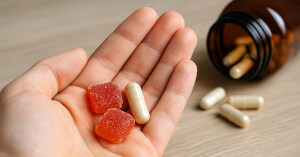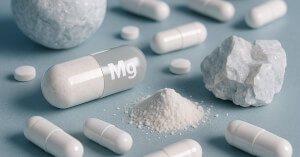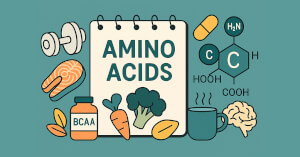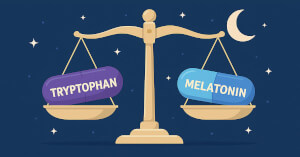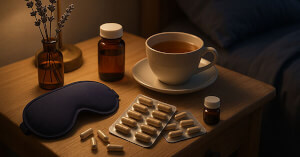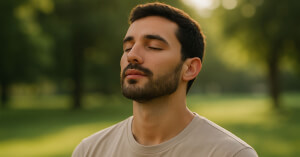
What Supplements Can Help with Depression?

Depression is complex: biology, hormones, sleep, stress, nutrition, and gut health all play a role. Supplements are not a cure, yet some nutrients and botanicals can support mood, especially for mild to moderate symptoms or when lab tests reveal a deficiency. Below you’ll find the best-studied supplements, broken down in simple terms with short summaries of what clinical studies have found.
Omega-3 (EPA & DHA)
Omega-3s from fish oil or algae help your brain cells communicate and may calm low-grade inflammation that can affect mood. EPA seems to be the key player for depression, with DHA still important for overall brain health.
📊 Clinical Evidence: A 2021 review in adults with depression found a small to modest symptom reduction with omega-3s compared with placebo, but the certainty of the evidence was low to very low.
✔️ Typical Dosage Range: 1 to 2 g per day of combined EPA + DHA with meals. Many mood-focused trials favor EPA-rich formulas.
SAMe
SAMe is a compound your body makes for "methylation," a process that helps produce neurotransmitters like serotonin and dopamine. Supplemental SAMe can raise these pathways and may lift mood in some people.
📊 Clinical Evidence: A 2024 review of randomized trials reported that SAMe improved depressive symptoms and was generally acceptable compared with placebo or antidepressants.
✔️ Typical Dosage Range: 400 to 1,200 mg per day, split in two doses, ideally on an empty stomach. Note: Use medical supervision if you have bipolar disorder due to risk of mood elevation.
Vitamin D
Vitamin D receptors sit in brain regions tied to mood. If your level is low, topping it up can help overall health and may support mood. If your level is normal, benefits are less certain.
📊 Clinical Evidence: A 2023/2024 meta-analysis found that vitamin D₃ supplementation produced a small but statistically significant reduction in depressive symptoms
✔️ Typical Dosage Range: 1,000 to 2,000 IU daily.
5-MTHF
5-MTHF, also known as L-methylfolate, is the active form of vitamin B9, part of the B-vitamin family. It plays a key role in producing serotonin, dopamine, and norepinephrine, the neurotransmitters that influence mood and motivation.
Some people can't efficiently convert regular folic acid into this active form because of a common MTHFR gene variant. As a result, folate activity in the brain can drop, which may contribute to low mood or poor antidepressant response.
📊 Clinical Evidence: In a 2012 trial, adults whose depression did not fully improve with standard antidepressants showed significantly greater mood improvement when 15 mg/day of 5-MTHF was added to their treatment compared with placebo.
✔️ Typical Dosage Range: 7.5 – 15 mg daily of L-methylfolate (5-MTHF), usually as an adjunct to antidepressant therapy and under medical supervision.
Note: Since 5-MTHF is part of the B-vitamin network, combining it with adequate vitamin B6 and B12 helps keep homocysteine in check, an amino acid that rises when B-vitamin status is low and is linked to fatigue, brain fog, and low mood.
St. John's Wort
St. John's wort is a well-studied herb for mild to moderate depression. It appears to influence serotonin, dopamine, and norepinephrine signaling. It can be effective, but interactions are a big concern.
📊 Clinical Evidence: Systematic reviews and meta-analyses have found that St. John's Wort is more effective than placebo and roughly comparable to standard antidepressants for mild to moderate depression, with generally fewer side effects.
✔️ Typical Dosage Range: 300 to 900 mg per day of standardized extract in 2 to 3 doses.
Important: St. John's Wort can make many medicines less effective, including antidepressants, birth control pills, and blood thinners, because it speeds up how the liver breaks them down. Taking it with other antidepressants can also raise serotonin too high, which may cause a rare but serious reaction called serotonin syndrome. Always check with your doctor or pharmacist before using this herb.
Saffron
Saffron’s active compounds, including crocin and safranal, may help balance serotonin and dopamine activity in the brain and reduce low-grade inflammation that can influence mood. Among botanicals, saffron shows some of the most consistent clinical results for improving depressive symptoms.
📊 Clinical Evidence: Meta-analyses and randomized controlled trials show that saffron outperforms placebo and works about as well as certain antidepressants for mild to moderate depression, with generally good tolerability.
✔️ Typical Dosage Range: 28 to 30 mg per day of standardized extract, usually split into two doses.
Note: Avoid high doses during pregnancy. Use caution if you're taking antidepressants or other supplements that affect serotonin, unless your healthcare provider says it's safe.
Probiotics
Your gut talks to your brain through nerves, immune messengers, and tiny molecules made by gut bacteria. Some probiotic strains can lower inflammation and stress hormones, which may help improve mood and resilience.
The best-studied strains for mild depressive symptoms are Lactobacillus rhamnosus (especially HN001), Bifidobacterium longum (such as NCC3001), and Lactobacillus helveticus combined with Bifidobacterium bifidum. These have shown benefits in clinical trials, mainly when used alongside standard care rather than as stand-alone treatments.
📊 Clinical Evidence: A 2021 meta-analysis found that probiotics helped reduce depressive symptoms when taken alongside antidepressants, but results were not reliable when probiotics were used on their own. This suggests probiotics are better as an add-on rather than a replacement for standard treatment.
In a 2022 randomized trial, adults with major depression who took a short course of high-dose probiotics showed mood improvements along with measurable changes in gut bacteria and brain activity patterns.
✔️ Typical Dosage Range: 1 to 10 billion CFU daily of well-studied strains (for example Lactobacillus and Bifidobacterium species). Pair with fiber-rich foods or a prebiotic for better support.
Takeaway
Supplements can play a supportive role, but they are not a replacement for medical care or therapy. If your symptoms are moderate to severe, if you have thoughts of self-harm, or if your mood is worsening, seek help from a healthcare professional immediately.
- Best overall evidence here: saffron for mild to moderate symptoms, omega-3s for modest support, vitamin D when deficient, and targeted B-vitamin strategies like L-methylfolate in SSRI non-responders.
- Test, then target: consider labs for 25-OH vitamin D, B12, folate, and homocysteine to guide choices.
- Start low, go slow: introduce one supplement at a time and track energy, sleep, and mood over 6 to 12 weeks.
- Check interactions: especially with St. John's wort and SAMe. When in doubt, ask your clinician or pharmacist.
FAQs
Can supplements really help with depression?
Supplements aren’t a replacement for therapy or medication, but some nutrients — like saffron, omega-3s, and vitamin D — have real evidence showing they can support mood and energy levels, especially when you’re low in those nutrients.
What are the most effective natural supplements for depression?
Among the best studied are saffron, omega-3 fatty acids, SAMe, and L-methylfolate (5-MTHF). These have the strongest clinical data for mild to moderate depression and are often used alongside standard treatment.
How long does it take for supplements to work on mood?
Most studies show benefits after 6 to 12 weeks of daily use. Mood changes tend to build gradually — you may first notice better sleep or energy before a lift in mood.
Can I take saffron or St. John’s wort with antidepressants?
It’s best not to combine them without medical supervision. Both can affect serotonin and may interact with antidepressant drugs, increasing the risk of side effects like serotonin syndrome.
Is vitamin D deficiency linked to depression?
Low vitamin D levels are common in people with depression. Supplementing can help if you’re deficient, but studies show little benefit for those who already have normal levels.
Which probiotic strains help with mood?
Research suggests that Lactobacillus rhamnosus (HN001), Bifidobacterium longum (NCC3001), and combinations of L. helveticus with B. bifidum can support gut–brain balance and modestly improve depressive symptoms.
Are there any side effects to taking mood supplements?
Most are well tolerated, but herbal extracts like St. John’s wort can interact with medications. SAMe may cause mild stomach upset or anxiety in some people. Always talk with your healthcare provider before starting anything new.
This article was originally published on Stackbb, your trusted source for science-based supplement guides.
